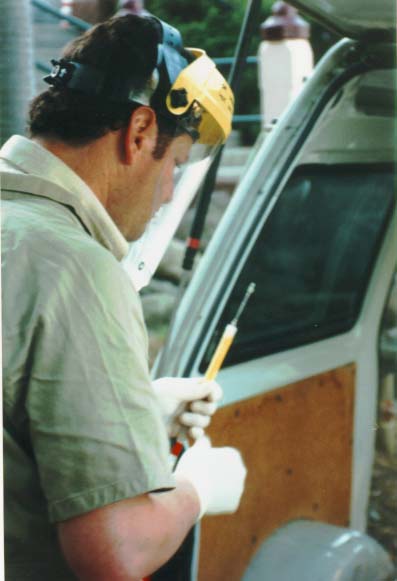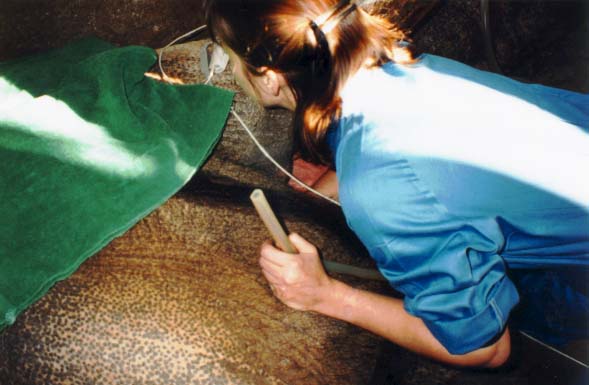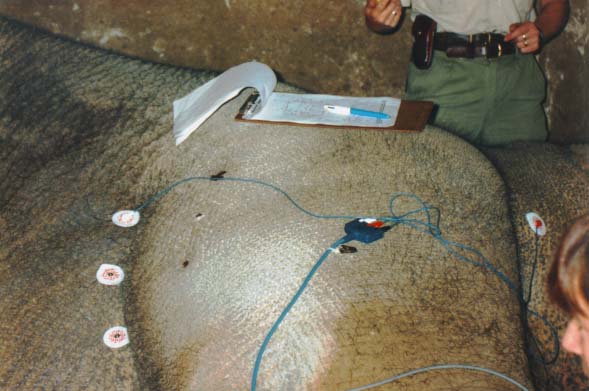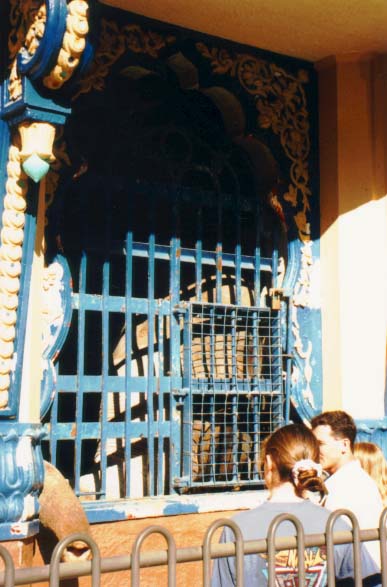John's Excellent Elephant Anaesthesia Adventure
Taronga Zoo - 1995
What follows is the pictorial account of one of the most
extraordinary experiences of my life. I was privileged to accompany
Dr Martin Pearson, then Head of Veterinary Anaesthesia at the
University of Sydney, to Taronga Zoo to assist the zoo vets with an
anaesthetic for He-Man, one of the zoo's elephants. He-Man had a
crack in one of his foot-pads and required a pedicure!
Now this may not seem like a big deal to some veterinary folks,
but it made a rather interesting change for a doctor accustomed to
giving anaesthetics to humans!
All the photos in this page are displayed at 40% of their actual
size. You can click on any of them for a closer look.
 We
arrived at the zoo very early but there was already a vast crowd of
zoo staff milling about the elephant house. The magnitude of the
project became obvious with the arrival of a chap carrying a rifle
for the protection of staff in an emergency, closely followed by a
large piece of earth moving equipment which was to be used if He-Man
fell into a difficult position after he was darted.
We
arrived at the zoo very early but there was already a vast crowd of
zoo staff milling about the elephant house. The magnitude of the
project became obvious with the arrival of a chap carrying a rifle
for the protection of staff in an emergency, closely followed by a
large piece of earth moving equipment which was to be used if He-Man
fell into a difficult position after he was darted.

Martin (the tall, handsome guy in the middle) had brought along an
anaesthesia machine that was meant for a horse. I wasn't convinced it
would be suitable for an elephant but we didn't actually plan to use
it. It was there for backup only. If we did need to use it, I wasn't
volunteering to squeeze the bag!
While we got the rest of the anaesthesia type gear ready and
generally amused ourselves, Larry Vogelnest, the head vet at the zoo,
prepared the dart. It contained etorphine, a narcotic many thousand
times more potent than morphine, and acepromazine. He wears a visor
and gloves because it's potent enough to kill him if he splashes it
in his eyes or scratches himself with it. I think that's why they
invited me!

Anyway, Larry spent a fair while after that standing at the window of
the house waiting for He-Man to get into a suitable position to be
darted. He wanted to be sure He-Man didn't go down with the dart
underneath him (I think). We were kept well back so He-Man would not
get too excited. When the dart finally flew I asked how long it would
take to work. "Anywhere between ten minutes and two hours" came the
answer! Prepared for the worst I sat down on the ground to wait.
CRASH!!! .....it only took ten minutes! It was like an earthquake and
as I wasn't exactly expecting it I was almost up the nearest tree
with fright.

Larry and a couple of the other zoo vets cautiously entered the
enclosure. After checking everything was safe they let the rest of us
in. Here was my big moment! I got to insert the intravenous cannula.
Where do I put it? Martin flipped over his ear and there on the back
was vein as big as a garden hose. Here you see the cannula, a 14G,
with my left hand next to it. The shiny stuff you see running away
from under the tap is the super glue we used to hold it in! "How do
we get it off at the end?" I asked. "It just comes away with a few
layers of dirt and loose skin". That figures. There isn't any
dressing on earth that would stick to that hide.
 Since
He-Man had some problems maintaining his airway during a previous
anaesthetic, Martin decided to intubate him. Anthea was the only one
with an arm small enough to fit through He-Man's teeth so she got to
do it. She eventually managed, with some difficulty, to pass a guide
hose into He-Man's larynx. To help her, I was listening for breath
sounds on the other end of the hose. Forgeting that an elephant has a
slightly larger tidal volume than a human, I got a good blast in the
ear!
Since
He-Man had some problems maintaining his airway during a previous
anaesthetic, Martin decided to intubate him. Anthea was the only one
with an arm small enough to fit through He-Man's teeth so she got to
do it. She eventually managed, with some difficulty, to pass a guide
hose into He-Man's larynx. To help her, I was listening for breath
sounds on the other end of the hose. Forgeting that an elephant has a
slightly larger tidal volume than a human, I got a good blast in the
ear!
 A
horse endotracheal tube was passed over the hose and the hose left in
place for insufflating supplemental oxygen.
A
horse endotracheal tube was passed over the hose and the hose left in
place for insufflating supplemental oxygen.
While all this was going on we were also trying to set up some
monitoring. After trying several other places, we finally got the
pulse oximeter to work on the septum of the trunk. It gave a good
reading and indicated He-Man was breathing just fine. Meanwhile,
there was a crowd of other zoo folks setting about the various tasks
for which He-Man was having the anaesthetic. The "pedicure" began,
while others measured every part of He-Man there was to measure.
Notes were taken about everything.

 An
electrocardiogram was also set up, again requiring several tries
before suitable dot positions were found. The three dark marks to the
right of the three ECG dots on his front leg are where several doses
of antibiotics were injected. His heart rate was about 35.
An
electrocardiogram was also set up, again requiring several tries
before suitable dot positions were found. The three dark marks to the
right of the three ECG dots on his front leg are where several doses
of antibiotics were injected. His heart rate was about 35.
 After
unsuccessfully trying to get non-invasive blood pressure to work on
the tail, an arterial cannula was also inserted in the back of the
ear. Blood samples were taken from this cannula as well. His blood
pressure was about 120/70mmHg - much the same as a human's.
After
unsuccessfully trying to get non-invasive blood pressure to work on
the tail, an arterial cannula was also inserted in the back of the
ear. Blood samples were taken from this cannula as well. His blood
pressure was about 120/70mmHg - much the same as a human's.

The saturation, ECG and blood pressure were all monitored using this
monitor sitting on the ground behind his forelegs. When this photo
was taken, we were still trying to get the non-invasive BP to work on
the tail, hence the blue tubing heading off towards his rear.


And this is what it was all for. He-Man's pedicure. The crack was
filled with some sort of putty, and his toenails were trimmed. As a
souvenir of this great event was high on my list of priority, the
obvious choice was a few slabs of elephant toenail. They didn't
exactly smell of roses but I pocketed them anyway. My wife was not
impressed. Her comment..."There are enough bits of YOUR toenails
lying around this house without bringing those home with you!"
And finally, when all the work was done and about an hour after
He-Man was rendered unconscious, we prepared to wake him up. All the
monitoring was removed along with the arterial line and all the
equipment and anyone not considered necessary (including me) taken
out of the enclosure. Larry and Martin reversed the etorphine with
naloxone mixed with another very long acting weak partial agonist,
pulled out the cannula (with the layers of dirt and loose skin
attached as predicted) and got themselves out. Within a few minutes,
He-Man was on his feet again, looking like nothing had happened,
poking his trunk out through the bars.
 The
whole procedure had been planned very concisely and from the start of
the show it went like clockwork. When He-Man woke up all the zoo
folks, who regard the animals much as they would their own children,
breathed a huge sigh of relief. This was not a minor undertaking!
Afterwards we were treated to a very pleasant morning tea with the
zoo folks and a brief tour of the new reptile exhibit.
The
whole procedure had been planned very concisely and from the start of
the show it went like clockwork. When He-Man woke up all the zoo
folks, who regard the animals much as they would their own children,
breathed a huge sigh of relief. This was not a minor undertaking!
Afterwards we were treated to a very pleasant morning tea with the
zoo folks and a brief tour of the new reptile exhibit.
WHAT A DAY!
I must thank Martin Pearson for allowing me to tag along, and Larry
and the other staff of Taronga Zoo for their wonderful
hospitality.
...Pooh was saying to himself, "If only I could think of something!"
For he felt very sure that a Very Clever Brain could catch a
Heffalump if only he knew the right way to go about it."
A.A. Milne (1882-1956) - Winnie the Pooh
You are visitor number  since November 28,2001.
since November 28,2001.
This page is maintained by:
John
Loadsman,
Department of Anaesthetics,
Royal Prince Alfred Hospital,
Camperdown, Australia, 2050
Fax +61 2 9519 2455
Telephone +61 2 9515 8564
Return to John Loadsman's page
 We
arrived at the zoo very early but there was already a vast crowd of
zoo staff milling about the elephant house. The magnitude of the
project became obvious with the arrival of a chap carrying a rifle
for the protection of staff in an emergency, closely followed by a
large piece of earth moving equipment which was to be used if He-Man
fell into a difficult position after he was darted.
We
arrived at the zoo very early but there was already a vast crowd of
zoo staff milling about the elephant house. The magnitude of the
project became obvious with the arrival of a chap carrying a rifle
for the protection of staff in an emergency, closely followed by a
large piece of earth moving equipment which was to be used if He-Man
fell into a difficult position after he was darted.










